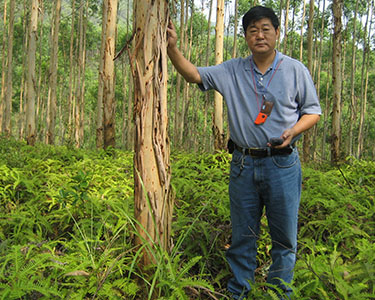 “Love what you do” – these words are Hanmin Dong’s advice for UBC Forestry students and alumni. With three degrees and a career focused on forestry, Hanmin has followed this advice. He believes that forestry isn’t necessarily a career you follow for money, so it is important that you have a passion for it.
“Love what you do” – these words are Hanmin Dong’s advice for UBC Forestry students and alumni. With three degrees and a career focused on forestry, Hanmin has followed this advice. He believes that forestry isn’t necessarily a career you follow for money, so it is important that you have a passion for it.
Hanmin grew up in the countryside in China and wanted to see the world, something he knew little about as the world was China to him. He found that forests in novels amazed him. He decided to go to university and when he did his national entrance exam and entered 3 options for majors, he chose Forestry, Geology and Petroleum as he thought he could see what the “world” looked like. He was lucky to be permitted to be the first class to go to university after the Cultural Revolution in 1977.
Hanmin graduated from the Huazhong Agricultural University in Wuhan China with a Bachelor of Agriculture in Forestry. Through competition, he had the opportunity to study abroad and UBC was his top choice. He started in October 1983 and received his Master of Forestry in 1986.
Coming to UBC and Canada, there were many cultural shocks, a few of which Hanmin still remembers. The first was while taking a class on soils he was faced with writing his first project paper, something he had never done before. In China classes only had exams, so this was completely new to him.
The second shock was when he was out one night to visit a scholar, the bicycle he enjoyed riding was stolen outside of the scholar’s hotel and the hotel called the police. According to Hanmin, dealing the police in Canada was very different and he was surprised when the police arrived with his bike 5 minutes later.
After graduating from UBC, Hanmin attended Texas A&M University where he completed a Ph.D. in quantitative genetics in 1990. He started his first job in the same year at International Paper in Bainbridge, Georgia as the Project Leader, Forest Productivity and Research. There he developed and implemented accelerated breeding programs for the improvement of loblolly pine, slash pine, sycamore and sweet gum.
Hanmin stayed with International Paper until 2001. He moved to Chicago, Illinois with the company as their Project Manager of Wood Fiber for the Masonite Building Materials Division. From there he moved into the role of General Manager, Shanghai International Paper Trading Co., Ltd. and Chief Representative, International Paper Asia Co Ltd, establishing a distribution system, a first for the company in China.
In 2001 his division was sold, and Hanmin became the Director of International Sales for CraftMaster Manufacturing Inc. in Chicago. In 2004 he was hired back by International Paper and relocated to Memphis, Tennessee as the Manager, Global Forestry – Asia Pacific. In 2008 International Paper sold its timberland and most of the foresters went along with the forestland to Resource Management Service (RMS), where Hanmin currently is the Director of China Investments in Birmingham, Alabama, as well as the President of Guangxi Lee & Man Forestry Technology Limited in Wuzhou, China. While he has a home office in McLean, VA, he spends most of his time in China.
Besides his company work, there are three contributions to Chinese forestry community that Hanmin is most proud of looking back at his career. The first was in 1996 when he worked closely with the Zhejiang and Fujian Provincial Department of Forestry to have introduced 28 families of loblolly pine from a natural distribution area in southern US. The two provinces benefited greatly from these seed source studies to date.
His second contribution was when he helped China Eucalyptus Research Center conceptualize and initiated the China Eucalyptus Breeding Alliance, the first forestry industrial cooperative in China. The third was his work to have founded China Forest Growers Association, a grass-root NGO prepared to register with the purpose of meeting the urgent need of China’s forest industry and providing a communications platform.
When asked what career he would have chosen if he hadn’t been a forester, Hanmin admits that he’s never thought of anything else. He loves what he does.
From Branchlines Spring 2015